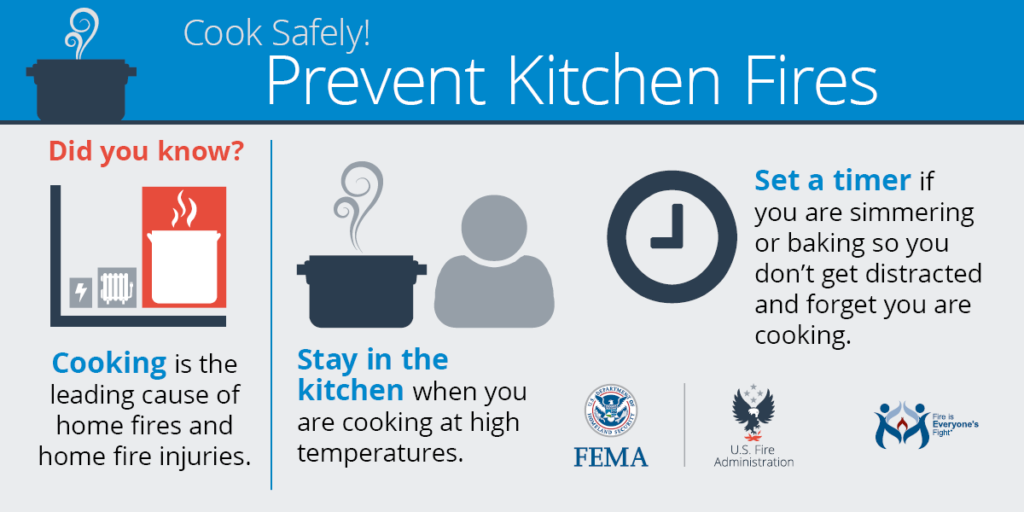
Cooking Safety – Cooking is the leading cause of reported home fires and home fire injuries and the second leading cause of home fire deaths. Thanksgiving is the peak day for home cooking fires, followed by Christmas Day and Christmas Eve.
Cooking Fire Statistics
Based on 2017-2021 annual averages:
- Two-thirds of home cooking fires start with the ignition of food or other cooking materials.
- Clothing is the item first ignited in less than 1% of home cooking fires, but clothing ignitions caused 8% of the home cooking fire deaths.
- Ranges or cooktops account for over half (53%) of home cooking fire incidents.
- Unattended equipment is a factor in over one quarter (29%) of reported home cooking fires and half of the associated deaths.
What you should know about home cooking safety
- Be on alert! If you are sleepy or have consumed alcohol, don’t use the stove or stovetop.
- Stay in the kitchen while you are frying, grilling, boiling, or broiling food.
- If you are simmering, baking, or roasting food, check it regularly, remain in the kitchen while food is cooking, and use a timer to remind you that you are cooking.
- Keep anything that can catch fire — oven mitts, wooden utensils, food packaging, towels or curtains — away from your stovetop.
If you have a cooking fire
- Just get out! When you leave, close the door behind you to help contain the fire.
- Call 9-1-1 or the local emergency number after you leave.
- If you try to fight the fire, be sure others are getting out and you have a clear way out.
- Keep a lid nearby when you’re cooking to smother small grease fires. Smother the fire by sliding the lid over the pan and turn off the stovetop. Leave the pan covered until it is completely cooled.
- For an oven fire, turn off the heat and keep the door closed.
Safety considerations for cooking with oil
- Always stay in the kitchen when frying on the stovetop.
- Keep an eye on what you fry. If you see wisps of smoke or the oil smells, immediately turn off the burner and/or carefully remove the pan from the burner. Smoke is a danger sign that the oil is too hot.
- Heat the oil slowly to the temperature you need for frying or sautéing.
- Add food gently to the pot or pan so the oil does not splatter.
- Always cook with a lid beside your pan. If you have a fire, slide the lid over the pan and turn off the burner. Do not remove the cover because the fire could start again. Let the pan cool for a long time. Never throw water on the fire.
- If the fire does not go out or you don’t feel comfortable sliding a lid over the pan, get everyone out of your home. Call the fire department from outside.
Comments are closed